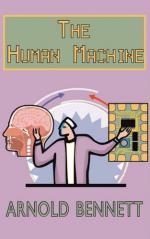IV
THE FIRST PRACTICAL STEP
The brain is a highly quaint organism. Let me say at once, lest I should be cannonaded by physiologists, psychologists, or metaphysicians, that by the ‘brain’ I mean the faculty which reasons and which gives orders to the muscles. I mean exactly what the plain man means by the brain. The brain is the diplomatist which arranges relations between our instinctive self and the universe, and it fulfils its mission when it provides for the maximum of freedom to the instincts with the minimum of friction. It argues with the instincts. It takes them on one side and points out the unwisdom of certain performances. It catches them by the coat-tails when they are about to make fools of themselves. ’Don’t drink all that iced champagne at a draught,’ it says to one instinct; ‘we may die of it.’ ‘Don’t catch that rude fellow one in the eye,’ it says to another instinct; ‘he is more powerful than us.’ It is, in fact, a majestic spectacle of common sense. And yet it has the most extraordinary lapses. It is just like that man—we all know him and consult him—who is a continual fount of excellent, sagacious advice on everything, but who somehow cannot bring his sagacity to bear on his own personal career.
In the matter of its own special activities the brain is usually undisciplined and unreliable. We never know what it will do next. We give it some work to do, say, as we are walking along the street to the office. Perhaps it has to devise some scheme for making L150 suffice for L200, or perhaps it has to plan out the heads of a very important letter. We meet a pretty woman, and away that undisciplined, sagacious brain runs after her, dropping the scheme or the draft letter, and amusing itself with aspirations or regrets for half an hour, an hour, sometimes a day. The serious part of our instinctive self feebly remonstrates, but without effect. Or it may be that we have suffered a great disappointment, which is definite and hopeless. Will the brain, like a sensible creature, leave that disappointment alone, and instead of living in the past live in the present or the future? Not it! Though it knows perfectly well that it is wasting its time and




